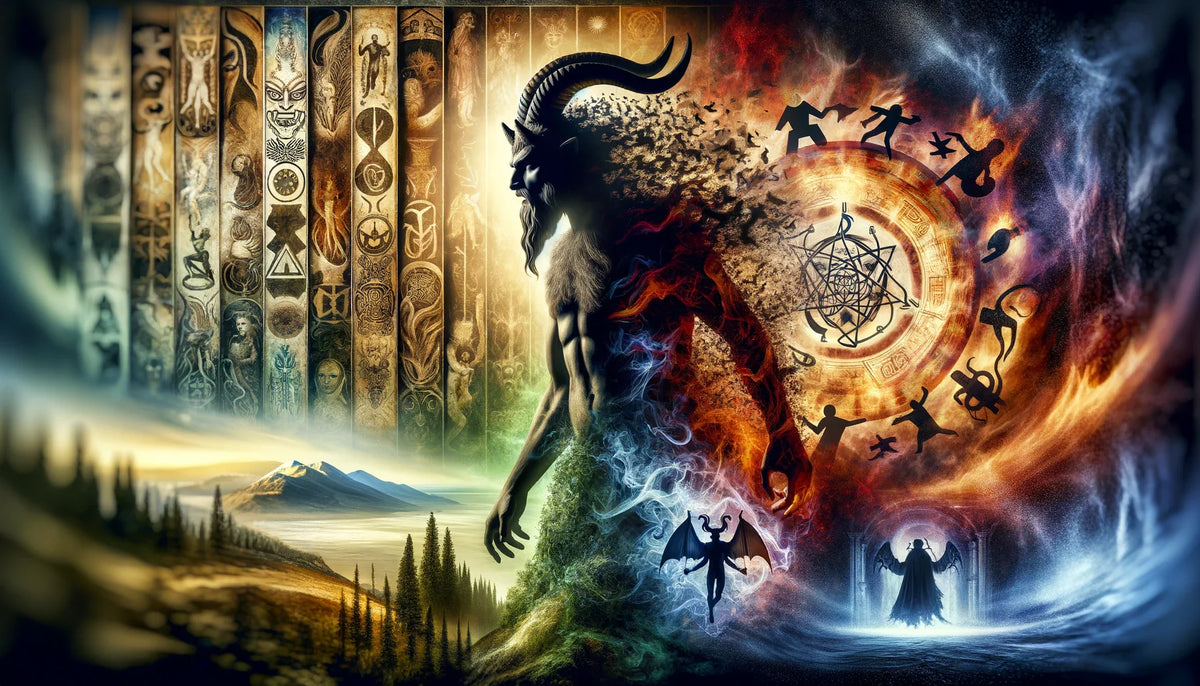
Demonization Unveiled: How Pagan Deities Became Symbols of Evil
|
|
Time to read 5 min
|
|
Time to read 5 min
Throughout history, religious and spiritual beliefs have shaped how societies interpret their world. One fascinating yet contentious phenomenon within this history is the demonization of pagan deities, a process in which once-revered gods and spirits were transformed into demonic figures by emerging religions. Understanding this transformation provides insight into historical religious conflicts, cultural shifts, and lingering biases in modern spirituality.
Table of content
Unlock the Mysteries of the Ars Goetia with a Free Oracle Tarot Reading , performed by the most experienced masters of Terra Incognita . This powerful reading is not a game—it is a serious and profound spiritual tool designed to provide clarity, guidance, and transformation. Only sincere requests are taken into consideration, ensuring that each reading is handled with the utmost dedication and expertise. Your personalized results will be delivered within 48 hours , offering you the wisdom and insight you seek.
👉 Submit your request here: Free Ars Goetia Oracle Tarot Reading
Are you ready to uncover the answers hidden within the shadows?
To understand how and why pagan deities were demonized, it's essential to consider the historical context of religious power dynamics. As monotheistic religions like Christianity and Islam spread, they often encountered and sought to supplant established polytheistic traditions.
Religious Supremacy: Monotheistic religions often positioned themselves as the one "true" faith. This ideological stance necessitated undermining other belief systems. Thus, the revered gods of polytheistic cultures were frequently portrayed as demons or corrupt spiritual beings.
Cultural Dominance: In many cases, religion was intertwined with political power. The rise of Christianity within the Roman Empire, for instance, saw a decline in the worship of traditional Greco-Roman gods as the new faith took root. Pagan practices and symbols were discouraged, and their worshipers faced stigmatization.
Syncretism: The interplay between monotheistic and polytheistic religions led to the blending of beliefs. In this fusion, pagan deities would sometimes be integrated into the new faith but with altered, often negative, characteristics. For instance, Celtic gods in Britain and Ireland were portrayed as malevolent spirits or demonic figures.
The demonization process affected various pantheons and individual deities worldwide.
Celtic Deities: With the spread of Christianity across the British Isles, many Celtic gods, such as Cernunnos, a horned god associated with fertility and nature, were demonized. Christian missionaries portrayed him as a devilish figure due to his horns and primal attributes.
Mesopotamian Spirits: Lilith, originally a spirit in Mesopotamian mythology, became a demonic entity in later Jewish and Christian traditions. Once viewed as a protector of women, she was turned into a succubus-like figure, preying on men and newborns.
Norse Gods: In Norse mythology, gods like Loki, known for his trickster nature, were vilified in Christian retellings. Loki's transformation into a malevolent force, especially with the introduction of Christian eschatology, served to align him with the concept of Satan.
Greek Gods: The Greek god Pan, revered as a pastoral deity, was also demonized due to his horns, goat-like legs, and association with sexuality. He became synonymous with Satan, reflecting the Christian view of the devil as a tempter.
The demonization of pagan deities continues to have significant implications for modern spiritual beliefs and cultural perceptions.
Lingering Biases: The historical stigmatization of pagan practices as demonic often persists today. This bias can lead to misunderstanding or hostility toward pagan religions like Wicca, neopaganism, and indigenous spiritualities.
Revival and Reinterpretation: In response to past demonization, many modern pagans seek to reclaim and reinterpret their ancestral gods. For instance, Cernunnos is now celebrated as a symbol of life and nature, while Lilith has been reframed as a feminist icon.
Popular Culture: The demonization of pagan deities has significantly shaped popular culture, particularly in literature and film. Figures like Pan, Loki, and Lilith frequently appear in fantasy settings, sometimes retaining their negative connotations but often gaining more nuanced portrayals.
Interfaith Dialogue: The recognition of historical demonization opens doors for interfaith dialogue, as it fosters understanding of how religious narratives can be shaped by bias. This awareness can promote mutual respect among different faith communities.
Restoration of Cultural Heritage: Efforts to restore the original stories and significance of pagan deities contribute to the preservation of cultural heritage. This restoration is particularly vital for indigenous and historically marginalized groups.
Educating Against Prejudice: Recognizing the historical context behind demonization helps counter prejudice. Education initiatives that dispel myths around paganism and related practices promote tolerance and acceptance.
The demonization of pagan deities is a testament to the power dynamics inherent in religious and cultural shifts throughout history. By understanding this phenomenon, we gain valuable insight into how emerging faiths historically negotiated their place in a diverse spiritual landscape. This knowledge also illuminates the prejudices and misconceptions that continue to shape modern perceptions of spirituality. Through critical analysis, interfaith dialogue, and respect for cultural heritage, we can move towards a more inclusive understanding of spiritual traditions worldwide.
Demon and Spirit Attunements, Amulets, and Grimoires are potent spiritual tools crafted to align your energy with powerful entities, offering protection, guidance, and healing. These sacred items bridge the gap between the earthly and spiritual realms, enabling you to connect with higher forces for clarity, empowerment, and inner strength. By wearing a demon or spirit amulet or engaging with a grimoire, you invite these potent energies into your life, providing ongoing support and shielding against negativity.
Demon and Spirit Attunements work to fine-tune your spiritual vibrations, enhancing your connection with specific entities and boosting your intuitive abilities. These practices create a comprehensive spiritual approach that not only protects you from harm but also opens pathways to profound transformation, spiritual growth, and inner wisdom. Through these tools, you harness the ancient powers of demons and spirits, forging a path toward deeper understanding and personal empowerment.